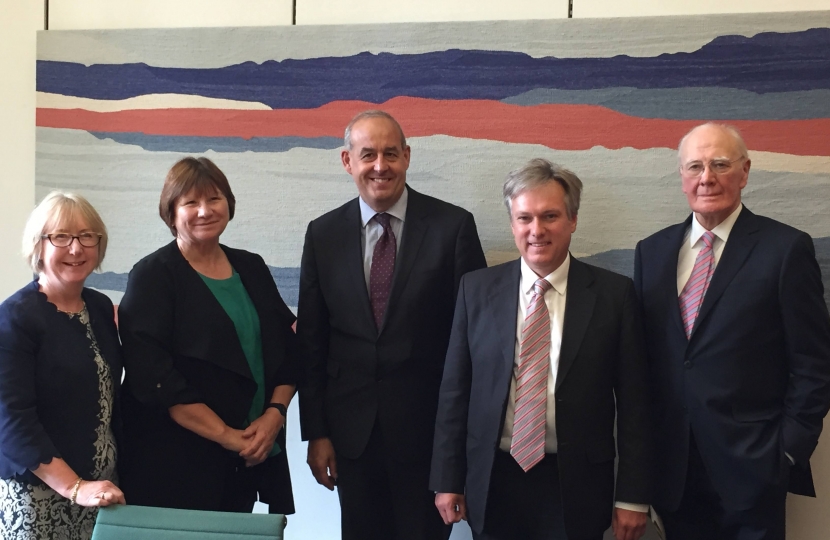
Henry Smith MP has reiterated his commitment to campaigning for better blood cancer care, as he was unanimously re-elected as Chair of the All-Party Parliamentary Group on Blood Cancer.
The APPG will continue its work to increase awareness of blood cancer and improve care and support for all those affected, following the meeting on Monday 3rd July which officially restarts the group following last month’s general election.
Launched last year, the Group began its first inquiry into blood cancer care in the NHS in March 2017. Following a call for evidence, the Group has received written submissions and will be holding oral evidence sessions in the coming months.
Henry said;
“I’m delighted to be joined by Conservative, Labour, Liberal Democrat and Democratic Unionist Party colleagues from both the Commons and the Lords as we continue to stand up for blood cancer patients and identify ways where we can do better for patients and their support networks.
“This is an important issue and one which has affected my own family and others in Crawley, I remain grateful to those locally who have shared their own family experiences with me.”
Blood cancer is a complex and often misunderstood clinical area. Despite low awareness, blood cancer is actually the third biggest cancer killer, with 38,000 people diagnosed each year. There are a total of 230,000 people in the UK living with a blood cancer, which includes the many times of leukaemia, lymphoma and myeloma as well as several other less common types.
The APPG inquiry will gain expert opinion from patients, clinicians, researchers and NHS staff to establish what is currently working well in blood cancer care, where there are gaps in services, and where policy makers and healthcare professionals need to target their efforts to improve the lives of patients.
Oral evidence sessions with clinical experts will be held after the summer parliamentary recess with the full report published before the end of the year.
Picture (left to right): Maggie Throup MP (Vice-Chair), Colleen Fletcher MP (Vice-Chair), David Hanson MP, Henry Smith MP (Chair), Lord Campbell of Pittenweem.
Follow Henry daily via:
 www.twitter.com/HenrySmithUK
www.twitter.com/HenrySmithUK
 www.facebook.com/HenrySmith4Crawley
www.facebook.com/HenrySmith4Crawley
 www.youtube.com/HenrySmithMP
www.youtube.com/HenrySmithMP
Notes
About the APPG on Blood Cancer
The Group held its first meeting on 14th June 2016, where Henry Smith MP was elected Chair. Following a number of meetings and events with parliamentarians the Group’s first public meeting was held on 18th January 2017, with the inquiry into blood cancer care launched on 15th March 2017.
Current officers of the Group:
Henry Smith MP, Chair
Colleen Fletcher MP, Vice-Chair
Maggie Throup MP, Vice-Chair
Jess Phillips MP, Officer
Jim Shannon MP, Officer
David Hanson MP, Officer
Nick Thomas-Symonds MP, Officer
About the APPG Inquiry into Blood Cancer Care in the NHS
The first inquiry by the APPG is a wide-ranging look at services across the blood cancer treatment pathway. It will look at five main areas, and address:
1. Public awareness and early diagnosis – the inquiry will seek to understand how awareness of blood cancer can be increased, and how this could help to speed up diagnosis.
2. Patient experience – the inquiry will look at some of the major differences between blood cancer and solid tumour cancers, how this translates into different patient needs, and what specialist care may be required.
3. Living with and beyond blood cancer – with many patients living with their blood cancer for many years, the inquiry will look at how these patients can be best supported.
4. Access to new medicines and support for research – Access to new drugs is crucial for blood cancer care, as the common treatments of surgery and radiotherapy used for solid tumour cancers are not appropriate in blood cancer. The UK is a leading country in blood cancer research, and has helped develop many of the lifesaving treatments available today. The inquiry will look at how these related issues can be addressed and safeguarded to ensure patients continue to benefit from them.
5. NHS commissioning – the inquiry will look at how the NHS commissioning processes work in blood cancer care, and identify areas of success and where improvements could be made.



